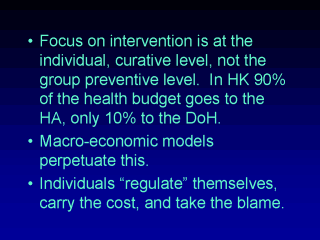| front |1 |2 |3 |4 |5 |6 |7 |8 |9 |10 |11 |12 |13 |14 |15 |16 |17 |18 |19 |20 |21 |22 |23 |24 | 25|26 |27 |28 |29 |30 |31 |32 |33 |34 |35 |36 |37 |38 |review |
 |
The interventions
for health are all focussed at the individual level, aimed to cure rather than prevent.
This can be seen in Hong Kong, where 90% of the health care budget goes on running
hospitals (mostly paying salaries of doctors and nurses) and only 10% goes to the
Department of Health to run prevention and screening programmes. This is perpetuated by the adoption of macro-economic models, which fail to adequately balance the need for a prosperous economy with the provision of real choices for people to make about how to live their lives. Profit should not be the only consideration. The result of the dominant model is that individuals regulate themselves in order to keep healthy, have to pay when they get sick and take the blame for doing so. There are many objections to this idea. Can you think of some? Further reading: Lupton D. The imperative of Health. Sage. 1995. |